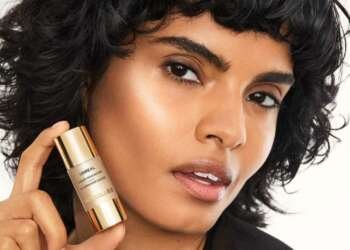Probiotics are well known for their gut health benefits, especially when enjoyed in yoghurt. But, what about probiotics in skin care — are they the same friendly bacteria scooping over your breakfast cereal, and will they work the same magic on your face? Brisbane dermatologist Dr Lisa Byrom, specialising in acne, rosacea, skin cancer, and pregnancy-related skin conditions, spills the science behind why probiotic lysates are fast becoming skin care’s secret weapon.
What Are Probiotic Lysates and Why Do They Matter?
“Probiotic lysates are fragments of beneficial bacteria that have been broken down, so they’re no longer ‘alive,’ but they still contain all the active compounds that can benefit the skin – like enzymes, peptides, and cell wall components,” says Dr Byrom. Unlike live probiotics, lysates don’t need to survive on the skin or in the product, “making them far more stable and easier to formulate.”
She distinguishes lysates from prebiotics, adding, “Prebiotics are ‘food’ for good bacteria – they nourish your existing skin microbiome but don’t deliver the same direct bioactive effects that lysates do.”
Why does this matter? “Your skin is home to a whole ecosystem of microbes that help keep it healthy. Probiotic lysates can tip the balance in favour of the good bacteria, reduce the numbers of harmful species, and calm inflammation triggered by microbiome imbalance,” Dr Byrom explains. This means they help “reduce skin reactivity, improve barrier function, and maintain that ‘calm, happy skin’ baseline.”
Skin Benefits and Who Should Use Them
Probiotic lysates can soothe and support a variety of skin concerns. Dr Byrom points out they’re beneficial for “sensitive skin, redness, acne-prone skin, and barrier-compromised conditions like eczema.” They’re also helpful during times of skin stress – “whether from over-exfoliation, seasonal changes, or treatments like retinoids.”
As for different skin types, Dr Byrom reassures that “Probiotic Lysates are generally very well tolerated. Even for sensitive, reactive, or acne-prone skin. Because they’re not live bacteria, they don’t carry a risk of infection, and their anti-inflammatory properties often make skin feel calmer and more comfortable.”

How Probiotic Lysates Support the Skin Barrier and Work with Other Ingredients
Probiotic lysates “help balance and support the skin’s microbiome, which plays a key role in maintaining a healthy barrier,” Dr Byrom explains. They “calm inflammation and stimulate the production of ceramides – lipids that strengthen the barrier and prevent moisture loss,” making skin more resilient.
The science backs these benefits: “Multiple laboratory and clinical studies show that probiotic lysates can reduce inflammatory markers in the skin, enhance barrier recovery, and improve visible redness.” They also “help the skin better tolerate active ingredients, reducing irritation when introducing them,” and some strains “have also been shown to inhibit acne-causing bacteria and soothe eczema-prone skin.”
Compared to other popular ingredients, Dr Byrom clarifies, “They work in a different way. Antioxidants fight free radical damage, and hyaluronic acid hydrates, but probiotic lysates target the skin’s immune and microbial balance. They’re complementary – so rather than replacing one with the other, you can use them together for broader skin support.” They also “play well with most actives – retinoids, vitamin C, niacinamide, AHAs/BHAs – because they’re not pH-dependent and are generally non-irritating.”
Practical Tips for Using Probiotic Lysates
To find probiotic lysates in products, look for ingredient names such as Lactobacillus ferment lysate, Bifida ferment lysate, or Saccharomyces ferment filtrate. Dr Byrom recommends, “The ingredient should be reasonably high on the ingredient list, ideally within the first half, so you know there’s enough to make a difference.”
She busts a common myth about probiotics in skin care: “One big misconception is that skin care probiotics need to be ‘alive’ to work. In reality, live probiotics are unstable in most cosmetic products, and it’s the beneficial bacterial components – not their living state – that deliver the results.”
For those starting out, Dr Byrom advises you, “Start with a daily-use product, such as esmi’s Probiotic Skin Mylck lotion, and apply it consistently – once or twice a day. Even though these formulas are gentle, introduce them gradually if your skin is sensitive or reactive. For best results, pair with a gentle, non-stripping cleanser. My recommendation is esmi’s Probiotic Skin Mylck Cleanser. Always follow with sunscreen during the day.”
As for results, Dr Byrom says you can expect to see “calmer skin within a week. Especially if their skin was reactive or inflamed to begin with. Barrier-strengthening benefits and more consistent skin tone typically become more obvious over 4-6 weeks.”

















